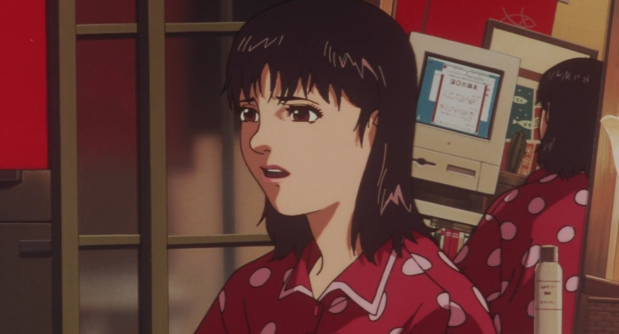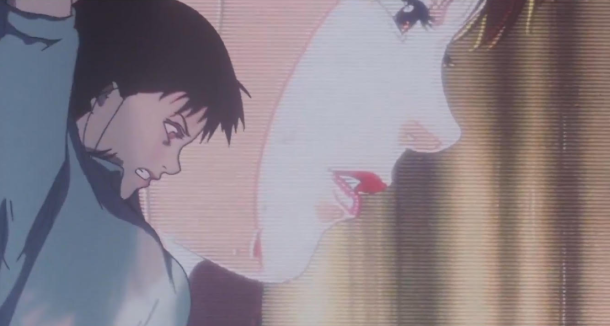A brief spoiler-free review of the 80-minute 1997 anime film “Perfect Blue,” animated by Madhouse, directed by Satoshi Kon, script by Sadayuki Murai, and loosely based on the novel “Perfect Blue: Complete Metamorphosis” by Yoshikazu Takeuchi.

Fantasy & Reality
Rising star Mima Kirigoe has just announced her retirement from her Japanese idol group to pursue an acting career. While she tries to convince herself that this is what she wants to be doing with her life, others couldn’t be in greater opposition. Namely, her fans, and one deranged creep in particular who begins to stalking her. As the people responsible for her career change are gruesomely murdered one by one, Mima herself starts to teeter on the edge of sanity.
From the genius mind of Satoshi Kon comes the bizarre story of a singer-turned-actor desperately trying to escape from the delusional head space that is causing the lines between fantasy and reality to blur. The film is swamped in Kon’s signature quick-cut directing style, with creative transitions, wacky visual perspectives, and bright colors guiding the eye through this terrifying narrative.

Kon’s attentiveness to defining the boundaries of fantasy and reality is exemplified in Perfect Blue. Sometimes we are shown Mima acting in a scene, while other times the stage is very much mirroring reality. Figures from Mima’s imagination haunt both her visions of reality and the viewer’s perception of it. You often find yourself asking, is this a dream? Or, perhaps, the nightmare that Mima’s reality has become?
Set at the dawn of the Internet Age, this psychedelic trip puts the viewer on a wild roller-coaster ride through the darker tunnels of human emotion. Paranoia, loneliness, and fear are thoroughly explored in this masterful film that demonstrates what the psychological thriller genre of entertainment can do when a gripping story is met with heart-pumping suspense and a clever directing style that shows you exactly what it wants, when it wants.

Living in Duality
Perfect Blue begins at the end. That is to say, the end of Mima’s career as a pop idol, and the beginning of her acting career. Despite being a beloved icon on stage, her back stage life is actually a realistic mess. Her apartment is cluttered, and she’s so in-and-out all the time that the cheese she buys at the beginning of the film expires a few scenes later. Mima is, to be frank, just another teenage girl trying to make a living in modern day Japan.
As such, it’s no surprise that Mima’s idol career was suffocating her. Much like a high school memory, sure, she had fun. But maybe it’s time to move on now. She is characterized by a sense of modesty and passion for her work, although she’s perfectly fine with moving on to a new phase of her life. That is, until the industry starts to exploit her talents.

Without going into spoilers, I merely can offer this small sentiment: We really don’t have any idea of how the industry works, unless we are actively a part of it. In the world of money and fame, it’s not about you want to do, but rather about what other people want you to do. Sure, a girl can give her verbal consent, but that doesn’t necessarily mean she would be comfortable with being used for someone else’s gain. As an actor, you serve the director, and sometimes that can conflict with your own moral values as a person.
As the story goes along, Mima becomes a victim of forced maturation. This includes being thrust into horrific rape scene that, despite knowing it is fake, scars her poor young mind. She is also met with increased anxiety, depression, PTSD, and even a separation of self by means of superstition. This delusional mindset causes negative thoughts to rise, as in so long as someone is Mima, who really cares if Mima is Mima. How the mind repairs itself and subconsciously shields you for self-protection is absolutely incredible, and that underlying theme is what ties every red thread in Perfect Blue together in one complex, disorienting knot.

Sensation, Perception, & Direction
Madhouse boosts Perfect Blue‘s production value with an unbelievable amount sensory detail work that I can’t even begin to comprehend. Flashing stage lights, rattling AC units, the motor noises of a 90s desktop computer, the gentle hum of a fish tank—it’s almost sensation in excess, which is just what this film needs. Transporting us to modern day Japan, the attention to detail enhances the setting, and makes the story feel all the more real.
Another gift of watching this film is getting to understand the iconography that makes it so famous beyond being just a really good movie. The bath scene where Mima curls up and screams, bubbles rising from the air of her trapped emotions is particularly beautiful. Seeing Mima hold a knife in midair against a flashing digital backdrop of own image embodies the epitome of suspense. And although creepy in context when paired with the scary music, the scene where Mima chases her dancing, skipping pop idol self through a hospital building conjures up true feelings of horror and hysteria.

Speaking of music, Masahiro Ikumi’s music score for the film adds an eeriness that today’s horror anime just can’t compete with. When we’re not jamming out to light idol music from the 90’s (or listening to it in the elevator . . .), pounding sound board effects, uneasy remixing, and metallic screeching accompany a wailing chorus of uncanny cries. It sounds unpleasant, and it is. But, without Ikumi’s OST, I doubt Mima’s experiences would’ve felt as intense and life-threatening as they were.

It’s A Maddening, Cruel World
Perfect Blue takes an introspective look at how fantasy can shape reality, and vice versa. In subtle ways, it asks the question that, as creators of some kind of content, what do we owe our consumers? Are we ever miscommunicating with our readers and viewers, and how would we know? Also, if our successes define us to some extend, how long will they cast shadows into our future?
The world is cruel, scary, and unfair. If it can take something from you, it will. And it won’t give anything back. But Perfect Blue also tells us that if any of these thoughts we are having bother us, then it’s all reality because these thoughts still shape how we feel in real life. Even the most seemingly sane people in our lives . . . We have no idea what they may be going through. Life is a performance, a stage, and if we don’t tell people about what’s going on, they might not ever know.
In that way, Mima’s story is one about winning yourself back. What does it take to feel confident in my words and thoughts, and how can I get to that place—that’s what I got from Perfect Blue.

A harrowing journey through a young woman’s psyche as she tries to escape from the fever dream that her reality is becoming, Perfect Blue effectively uses deception in anime to play with his viewer’s mind. The perception of reality cannot be trusted, especially as the psychodrama heightens towards the climax. But WOW is it a compelling mystery. You actively want Mima to figure out what’s wrong with her life—you want her to solve the case. And with a sucker punch ending that’ll hit ya right in gut, the whole experience comes to a satisfying conclusion.
Believe it or not, for a story that began with existential worry and cleverly crafted chaos, the ending of Perfect Blue provides an outlook that favors hope, confidence, and independence. And seeing the light of those perfect blue skies completes this wild yet captivating journey through the complexities of the human psyche.

The truth is that today more than ever, I wanted to have a good time with you. — Mima Kirigoe
Afterword
While I would recommend this film to every fan of anime out there, it IS full of gratuitous sex and violence. So, if either of those are triggering to you, definitely steer clear for a bit. More than just thrilling, suspenseful, and entertaining, Perfect Blue ponders so many ideas, from how the internet will forever change privacy, to the savagery in the entertainment world. A compelling mystery by master storyteller Kon himself, “Cafe Mocha” certified Perfect Blue can truly make you feel genuinely scared for your life (especially if you watch this at midnight by yourself like I did, eep).
I’d love to hear what you think of this classic film down in the comments! Special thanks go to GKIDS for rescuing this long out-of-print title and giving it a lovely Blu-ray remaster—they really are the best! Now, if you’ll excuse me, I have to go binge Love Live! . . . you know, to maintain my own sanity. ‘Till next time!
– Takuto, your host

